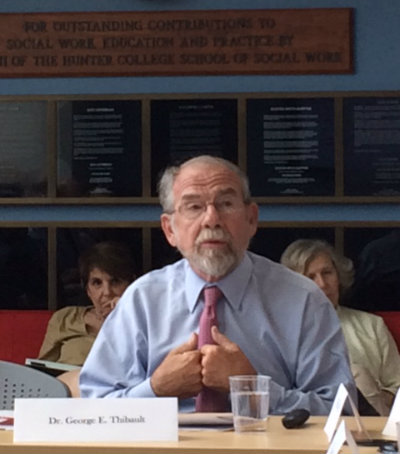 Dr. George E. Thibault presents on the importance of including social workers as part of health care teams at the Leadership Academy in Aging.
Dr. George E. Thibault presents on the importance of including social workers as part of health care teams at the Leadership Academy in Aging.We at the John A. Hartford Foundation like to encourage breaking down the professional silos that impede the promotion of coordinated, comprehensive, continuous, and geriatric-expert care. On Saturday, I witnessed a group of social work academic leaders exploring this topic with encouragement from a champion of interprofessional silo-busting.
George E. Thibault, MD, president of the Josiah Macy Jr. Foundation, discussed interprofessional education and collaborative practice with the deans and directors of schools of social work who were participating in the Leadership Academy in Aging.
Dr. Thibault and his foundation, often in partnership with us, have been promoting interprofessional education and collaborative practice through their grantmaking and programs. Dr. Thibault was invited to speak with these social work deans because of their expressed interest in pursuing partnerships with other health care professionals.
In his presentation, Dr. Thibault spoke of the importance of including social workers as part of the health care teams. (See Dr. Thibault's complete Power Point Presentation.) This is a topic I have written about on Health AGEnda many times over the years, most recently in Social Workers and Care Coordination: Becoming Leaders for Change and Tackling the Grand Challenges of Social Work.
Because of their unique perspective on addressing the psycho-social-behavioral needs of patients, social workers play a critical role in coordinating care and meeting the real-world needs of older adults. Thibault stated that there is evidence that care delivered by well-functioning teams is better care and therefore, team-based competencies should be a core goal of health professions education. He advocated, and we agree, that some part of every health professional’s education must be interprofessional.
The Leadership Academy in Aging is a year-long program designed through a partnership between the Social Work Leadership Institute and the National Association of Deans and Directors of Schools of Social Work (NADD) to provide leadership skills and aging education to deans and directors, who also receive guidance in developing a program on aging within their school. The co-leaders are longtime Hartford Foundation grantee and partner Pat Volland and Katharine Briar-Lawson, Dean and Professor, School of Social Welfare, University at Albany. Originally supported by the Hartford Foundation, the Leadership Academy is now supported in part by NADD and tuition from the deans/directors.
To date, 66 deans/directors have participated in the program, which just completed its sixth year.
Dr. Thibault reported that several nursing and medical schools have already collaborated on joint curriculum planning, and that the schools of social work need to also be at the table in these discussions. He recommended the conference convening reports funded by the Macy Foundation, as well as the work being conducted at the National Center for Interprofessional Education and Collaborative Practice at the University of Minnesota.
We at the Hartford Foundation also encourage schools of social work to collaborate with their health care partners in developing curriculum and programs that promote interprofessional education and collaborative practice.
And we are very grateful to leaders like George Thibault and Pat Volland for creating a forum to continue breaking down the silos that still keep too many older Americans from receiving the quality of care they deserve.
